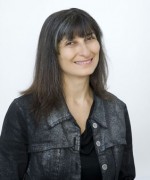Column Name
Title
Subhead
A few years after leaving Juilliard, Limor Nachmias Tomer (Pre-College ’78; B.M. ’82, M.M. ’83, piano) decided that she wasn’t that interested in hearing her own versions of classical pieces and moved away from performing. The Tel Aviv native (she had moved with her family to New York City when she was 13, when she enrolled in the Pre-College Division) had started out as a very traditional musician, but at Juilliard she became enamored of contemporary composition. When she decided to switch careers, there was only one place she wanted to work: the Brooklyn Academy of Music, a bastion of innovative programming, where she wound up spearheading both BAMRose Cinemas and BAMcafé. In 2006 she became executive producer for music at New York Public Radio station WNYC (she was concurrently the adjunct curator for performing arts at the Whitney Museum of American Art in New York). And starting May 2, Tomer, 48, will become the general manager of concerts and lectures at the Metropolitan Museum of Art. Recently, she spoke with The Journal about her career.
Body
How did you switch your allegiance to contemporary music?
Previously I’d had a fairly narrowly defined canon, but the class that really oriented me toward living composers was with Vincent Persichetti, when I was a master’s student. And then I worked with Joel Sachs on the first Focus! festival [in 1985], and my eyes and ears started to open even more. I started going to performances at BAM and listening to the music of [Juilliard alumni] Steve Reich and Philip Glass as well as Laurie Anderson and Meredith Monk. Those experiences proved to be extremely defining and path-setting. It’s not that I don’t adore Brahms and Beethoven, but I refuse to believe that the best that ever will be has already been written.
How did you happen to go into radio?
I didn’t have radio experience although I had been educated in a certain way by listening to WNYC when I was at Juilliard. When I was asked to join WNYC, they were interested in rethinking how to present classical music, and also because they were moving to a new facility with a live performance space. As it turned out, the way people engage with music and performance completely changed in the time that I was there because of the Internet. Radio used to be a one-way street, but it has become a two-way conversation: listeners are constantly talking back to us and helping to inform our decisions. For example, we created a mini radio station (NPR Music: 100 Composers Under 40) to exclusively play the music of young composers. We asked our listeners who their favorites were—we got hundreds of entries—and we crafted a station around them. New York Public Radio sees itself as a provider of music programming, whether it’s accessed at radio frequency on a transistor, or on an iPhone, or downloaded, or through a video player.
How do you think your WNYC experience will inform your work at the Met?
The Met is in transition right now, and I’m very energized by transitions. It’s such a high-energy, global institution; people follow it not just on 82nd Street, but all over the world. I’m curious to see how what I learned about transmitting and contextualizing and hearing music and performance will apply whether the audience is in the room or halfway across the world.
What do performing and programming have in common?
They’re both about telling the same story—whether it’s a Bach prelude and fugue or a Beethoven sonata marathon—in a completely new way. How do you contextualize things in a way people hadn’t thought of before? They’re both about communicating and amplifying truth and beauty. As a presenter, I’m not making the pieces, but I’m bringing the music to people and helping them interact with it.
How has your Juilliard experience shaped your career?
I was at Juilliard from age 13 to age 20—those are very defining years for anyone, and pretty much everything I do is in some way shaped by those experiences, by the people I was privileged to know and play with and hear, and by the level of punishing excellence and intellectual rigor. All of that is absolutely critical to me every day.





